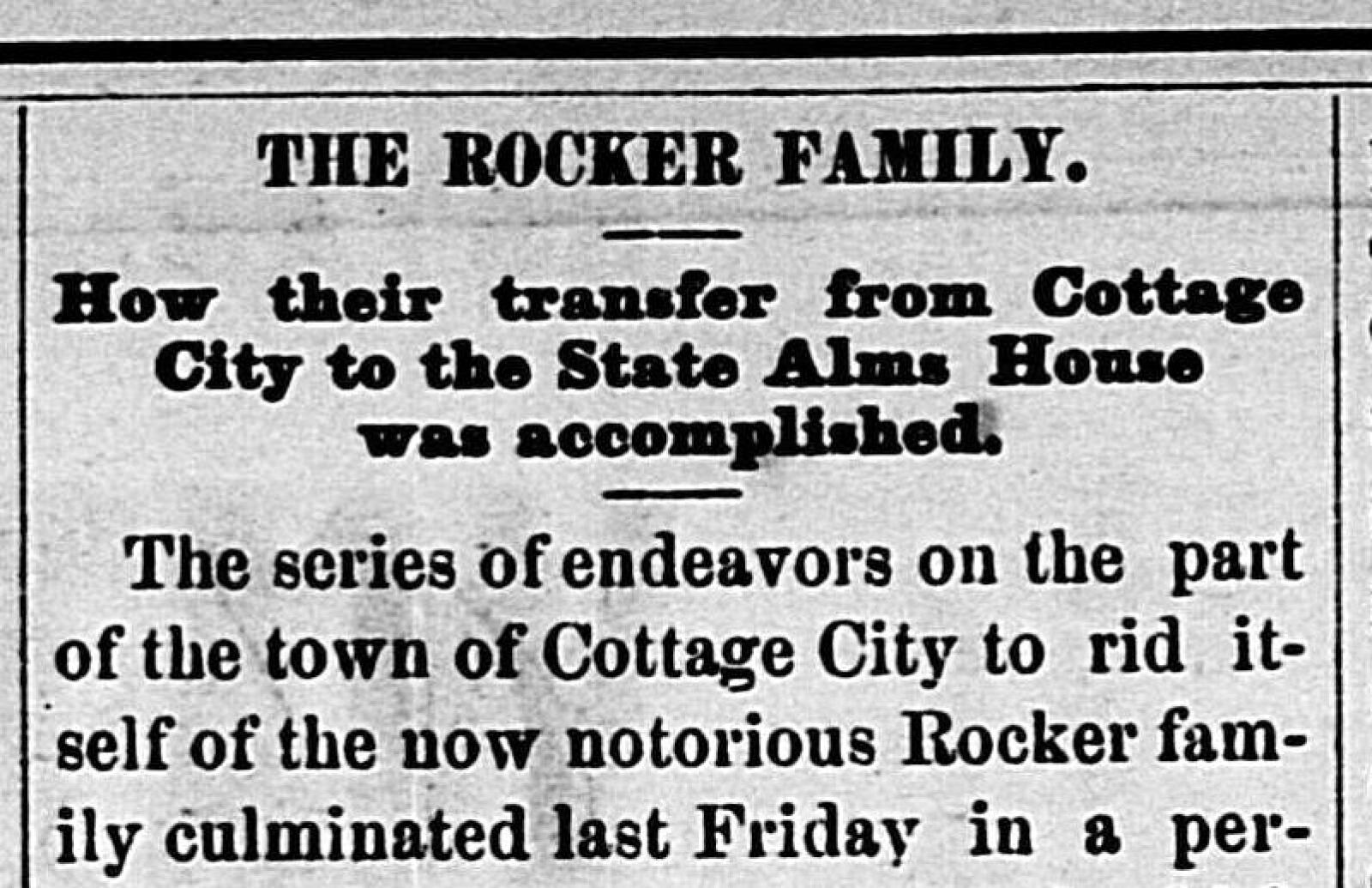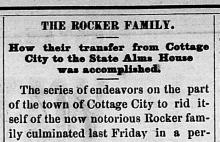The series of endeavors on the part of the town of Cottage City to rid itself of the now notorious Rocker family culminated last Friday in a performance, the true story of which reads more like the report of a riot in a Louisiana parish, or like a leaf from some yellow-colored “Life on the Border,” or like a chapter from Reade or Dickens on the administration of the charity laws in the old country, than like the simple account of the removal of the local authorities of a poor family, located in a New England town, to the paternal care of the government of the State of Massachusetts. The affair, almost a comedy by reason of the number and character of the officials engaged in it and the manner in which they acquitted themselves under the trying circumstances in which they found themselves placed, narrowly escaped developing into a tragedy before the performance was concluded.
For the benefit of those readers of the Gazette who may not be familiar with the facts in the case, it may be necessary to premise that the “Rocker family” consists of the widow and eight children of the late Antone Rocker, who departed this life a year or two since, the family having received more or less assistance both before and since the death of the husband and father. The wife is a daughter of the late William Matthews of Chappaquiddic, and of Margaret Matthews now living (formerly Margaret Prince), and the eight children are Lena, aged about 16 years, George 15, Frank 10, Antone 8, Willie six, Harry four, Lottie 3 and Nellie 18 months. Upon the division of Edgartown a difference arose between that town and Cottage City as to which town was liable for the maintenance of these people, and the courts decided recently that Cottage City had not established its case as against Edgartown, and the latter was left with the family still on its hands, and with no redress unless the State could be prevailed upon to assume the burden. No formal proceedings appear to have been had in the premises, but it is claimed by the selectmen of Cottage City that Dr. Wheelright, the State agent, had consented to receive the Rockers into the Alms House at Tewksbury until their status could be determined. At this time, and up to the date of the occurrences herein chronicled, Mrs. Rocker was in the service of a family in Middleboro where she was earning $3 per week, the daughter Lena was employed in Capt. Gifford’s family, and the other seven children were living with their grandmother, Mrs. Matthews, in her own cottage.
Armed with the agent’s permission, the selectmen waited up Mrs. Matthews Thursday, Jan. 25th, and told her she must get the children ready to go to the poor house at Tewksberry. To this Mrs. Matthews responded that she couldn’t let the children go without their mother, when she was informed that the mother had already been sent for. She then suggested that Lena was taking care of herself and was at work at Capt. Giffords, but the selectmen said she must go too - they must all go together. Mrs. Matthews then told the selectmen that they had made arrangements to live in New Bedford - had already actually engaged rooms; that a childless married daughter, Mrs. Magnett, had agreed to take two of them, and had found places for three others in the city, and that Eunice (their mother) could take care of the other three. But the selectmen told her they couldn’t have any such works as that - she must get them ready and they must go.
At the same visit Mr. Davis told Mrs. Matthews to send down for their weekly order - about $3.00 worth per week since last summer as near as she could judge, and about half that during the summer - but she said they shouldn’t want any more help, but should take care of themselves as she had indicated.
The following evening the selectmen called again, and about the same talk was had, the selectmen saying that they had an order from Dr. Wheelright for the removal of Mrs. Rocker and the children, and Mrs. Matthews insisting that they ought not to be taken to the poor-house, because they would need no more help from anyone but their own people. Mrs. Matthews further said to them that - for obvious reasons - her daughter had never been so well able to do for her children since she was married as now.
The following Saturday Eunice Rocker returned from Middleboro, accompanied from New Bedford by her sister, Olivia Magnett. The same night, Capt. Foss, of the selectmen, called to see when they would be ready. The women couldn’t see why the children should be taken to the almshouse when their friends were now able to take care of them. They further asked Capt. Foss what representations had been made in Boston, but he said “no matter.” Mrs. Magnett said she had come prepared to take five children to New Bedford with her. Capt. Foss consented to this if she would pay their fare, but when she declared her ability and readiness to do it, withdrew his consent. To the argument of the selectmen that their friends couldn’t support all these children, the grandmother rejoined that she was left with nine children, and brought them all up without assistance from anybody. She repeated her claim that now was the first time Eunice had been able to earn any money in many years.
On Monday Mrs. Rocker was ill, and Dr. John Pierce, who came up from Edgartown to answer to a dispatch, certified that she was not in condition to travel. The same day Capt. Foss gave them notice that if the family was not ready to move by the following day they should send for Mr. Dexter and should employ force. The following day Mr. Dexter did come up, but nothing was done.
Meanwhile Mrs. Matthews was advised by her son-in-law in New Bedford that he had consulted Messrs. Marston & Cobb, and had been advised by them that if the mother chose to take care of her children she could do so. That the family could come to New Bedford if they wanted to, but the selectmen had no authority to compel their removal. Magnett also wrote that Dr. Wheelright had telegraphed that the family need not be disturbed, and that a telegram had been sent to the selectmen of Cottage City to the same effect.
Nothing further seems to have transpired until Friday morning, at 7.30, when Constable Bates called at the cottage accompanied by the selectmen, Messrs. Davis, Ripley and Foss. Bates inquired for the Rocker woman and was told where she was. Capt. Foss asked Lena if she was staying at Capt. Gifford’s, and she replied that she was, except for a day or two since the trouble began. Intended to return there at once. Capt. Foss said they would see about that, and presently all but the constable went away, Foss soon returning to tell Lena that she couldn’t go back to Capt. Gifford’s.
Mr. Bates now told the mother to get herself and children ready, to which she replied that she would be ready Monday - to go to work, but not to the poor house. Mrs. Matthews asked for the officer’s authority, but he declined to produce it. Mrs. Rocker insisted that she wouldn’t be dragged to the poor-house when she could support herself and children. Presently - having meanwhile been persuaded by her mother to go into a back room - she gave a scream and seizing a chair rushed for the front room, but was prevented by Mrs. Matthews before she could reach the officer. The latter advised Mr. Bates to leave, and continued so advising him, quieting her daughter meanwhile, until Lena threated to scald him if he didn’t go. He still refused, until one of the girls threw a kettle of hot water upon him, when he went out, and the door was fastened behind him.
In about half an hour a knock was heard upon the side door, and in response to a question somebody outside threatened to break the door down if admission was refused. Mrs. Matthews told them to go away, but Mr. Davis told her it was no use to talk: “We’re going to have you niggers out of there.” Meanwhile the front door had given way under a succession of heavy blows, and Messrs. Foss, Dias and others appeared upon the scene, the latter armed with an axe. Their appearance was the signal for more hot water, which Foss dodged, but of which Dias and Davis got the benefit. Dias and Foss then went for Eunice and Lena Rocker, and Bates and Davis for Margaret Matthews (sister of Mrs. Rocker), one of them shouting, “We are going to have you, dead or alive.” The engagement now became general, with the odds in favor of the women, when Mr. J. O. Snell came to the rescue of one of the attacking parties, and among them they got away with Margaret and hoisted her out into the street. Meanwhile Mr. B. B. Leighton, who was looking in at a back window, saw that the fight was going hard with Messrs. Dias and Foss, and accordingly made his way valiantly to the front, seized an axe from one of the women and laid out Eunice Rocker with it, and then paid his respects to Lena Rocker, whom he succeded finally in knocking down.
All the women were finally overpowered, and Mrs. Rocker and the children were at once put into a wagon and driven - the younger ones half dressed - through the bitter cold of that winter morning to the boat.
Messrs. Dias and Foss came out of the fight looking a good deal the worse for wear - the former with an ugly cut on the head, and the latter with his jaw nearly broken - and the same day Margaret Matthews (the grandmother), Margaret E. Matthews and Eliza Simpson - aiding and abetting - were held by Trial Justice Luce for the grand jury, with bail fixed at $1,500 each on two complaints.
•
Editorial
We inquired last week who could (legally) compel the removal of the Rocker family from Cottage City while their status was yet undetermined; and the answer came the following day that their removal had already been compelled, and how and by whom. We raised that query with the understanding - and our subsequent information is to the same effect - that the question of the relation which these people bore to the State had not yet been decided, and that they were to be taken to the State institution pending the solution of that problem - perhaps for the purpose of affording a ground of action on which the case against Edgartown could be re-opened, with a new plaintiff. The removal, however, having been effected, the questions arise under what sanction it was undertaken, and in what manner it was accomplished.
We believe it is the policy of this Commonwealth, as of all civilized communities, to discourage pauperism and encourage self-support. Assuming this principle it is fair to conclude that the State agent’s permission for the removal of this family - which finally developed into an “order” - was obtained upon a misrepresentation of the facts. It is monstrous to suppose that Dr. Wheelright would have deliberately, and with full knowledge of the truth, ordered two self-supporting people to be taken from their regular labor and remanded to the condition of pauperism from which they were just struggling to emerge; and it isn’t probable that he would have extended the order to any of them if he had been made aware that friends had rallied for the protection and maintenance of all of them. And yet all of this had come to the knowledge of the local authorities. The weekly provision was refused, and reasonable cause was shown to the selectmen why even the modicum of assistance theretofore extended would no longer be required. We are not prepared to say how much consideration is to be attached to this fact, but in Smith vs. Peabody et al., 106 Mass., action for confinement of plaintiff’s children by defendant in poor-house while plaintiff was able to support them, the court say, “It does not appear that the plaintiff.....ever informed the overseers that she was able to support them”, - the reasonable inference form which is that had the overseers been so informed the children could not have been taken.
As to the manner of the removal, it is hardly conceivable that the law upholds such a proceeding as that of last Friday - which will permit an officer with his posse to invade by force a private dwelling, to batter in, knock down and drag out, as though the quest was for a desperate criminal instead of an innocent pauper. The fact is, the agent’s order was doubtless intended as an authorization rather than a peremptory instruction, and probably contemplated no such proceedings as were undertaken under its sanction. The authorities, however, proceeded to carry out their own plans, and the unfortunate family, believing that their rights were being violated, and filled with the terrors with which even the average mind invests the alms-houses of the State, resisted to the end.
Finally, as the immediate net result of the day’s work, we have two able-bodied persons withdrawn from their daily labor an dconsigned to the poor-house, a half dozen children confirmed in a pauperism from which they might have escaped, and the county saddled with the present maintenance of three alleged criminals and their further support if their conviction is secured.
•
There is no room for any charge of misplaced sentimentalism in respect of the public discussion of the scrimmage at Cottage City. The question isn’t simply whether or not a more or less objectionable family has been ill-treated, but whether or not in this Commonwealth of Massachusetts and County of Dukes County, ss, both the form and substance of law can be dispensed with whenever a community desires to rid itself of an alleged nuisance.
From the February 16, 1883 edition of the Vineyard Gazette:
It is reported, without contradiction, that the Rocker children were permitted to leave Tewksbury a day or two after their arrival there, and returned to New Bedford, the mother following shortly after. We have no information on the subject, but it may be presumed that the State authorities, finding that they had been made the victims of a misrepresentation of the facts, hastened to make the only reparation which was possible under the circumstances. In this connection it may be of interest to know that Dr. Wheelwright informed our informant that he did not intend that any such measures should be taken for the removal of the family as were adopted by the overseers.
•
Somehow the rejoicing at Cottage City over the removal of the Rocker family doesn’t seem to be as enthusiastic as might have been anticipated on the attainment of so much desired a result. Whether the active instruments of the removal begin to suspect that their personal expenses may more than offset any municipal advantage to be acquired thereby, or what the matter is, we are unable to say. Certain it is, however, that a sort of dubious uncertainty, as it were, coupled with an air of subdued melancholy, characterized alike those who counselled and those who carried into execution the famous coup d’etat of the 2d of February.







Comments